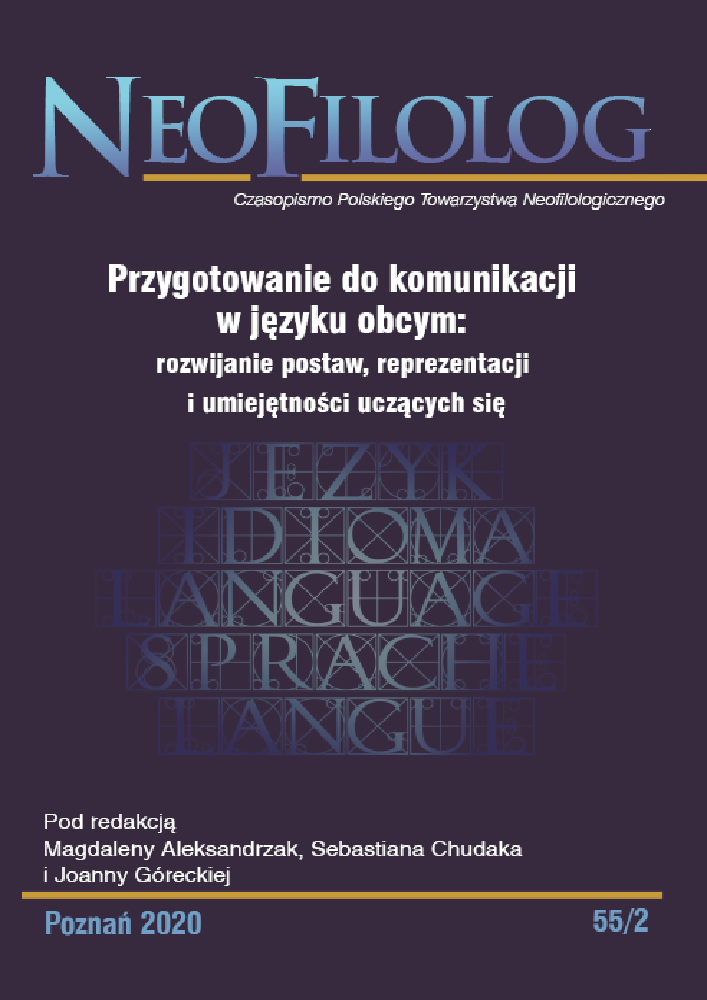Résumé
Abstract: In academic education there is an increased emphasis on curricula with activities that stimulate the acquisition of knowledge, development of skills and shaping of attitudes that are needed during intercultural meetings. Although the discussion on the substantive and methodological aspects of intercultural education, which has been going on for several decades, has raised many theoretical considerations and led to practical solutions, the issue of the evaluation of intercultural competences still remains quite problematic. What is intercultural competence? How can it be measured ? What tools should be used for this? How can their relevance and reliability be measured? These issues are discussed in the context of the European educational Erasmus+ project Connect (2015-2018).
Références
Błażek A. (2008), Evaluation interkultureller Kompetenz bei angehenden Deutschlehrerinnen und -lehrern in Polen. Poznań: Wydawnictwo Naukowe UAM.
Brandenburg U. i in. (2014), The Erasmus Impact Study. Luxembourg: Publications Office of the European Union.
Brandenburg U. i in. (2016), The Erasmus Impact Study. Regional Analysis. Luxembourg: Publications Office of the European Union.
Byram M. (1997): Teaching and assessing intercultural communicative competence. Clevedon: Multilingual Matters.
Chudak S., Mackiewicz M. (2018), „Die Deutschen sind irgendwie anders...” Folgen des Kulturschocks für die kulturelle Identität von polnischen ERASMUS-Studierenden: Ergebnisse einer qualitativen Studie, (w:) „GfL-Journal” nr 1/2018, s. 35-67. Online: http://www.gfl-journal.de [DW 10.11.2019].
Chudak S. (2013), Kompetencja medialna uczniów i nauczycieli języków obcych jako czynnik wpływający na poziom ich kompetencji interkulturowej, „Neofilolog”, nr 40/2, s. 219-236.
Dąbrowska-Resiak J. (2018), Erasmus... i co dalej? Badanie losów edukacyjnych i zawodowych polskich studentów uczestniczących w projektach mobilności w programie Erasmus. Warszawa: FRSE.
Ehrhardt C. (2018), Erasmus+: Potential für Lehre und Forschung. Zur Einleitung in den Themenschwerpunkt, „GfL-Journal”, nr 1/2018, s. 1-14. Online: http://www.gfl-journal.de [DW 10.11.2019].
Gaworska J. (2017): Pokolenie Erasmusa. Łódź: Wydawnictwo Mrówka.
Gesteland R. (2000): Różnice kulturowe a zachowania w biznesie. Warszawa: Wydawnictwo Naukowe PWN.
Hiller G.G. (2016), Eine Frage der Perspektive. Critical Incidents aus Studentenwerken und Hochschulverwaltung 30 Fallbeispiele aus der Praxis mit 93 interkulturellen Einschätzungen von Studierenden und Mitarbeitenden. Berlin: Deutsches Studentenwerk.
Holfter G., Rieder M. (2018), “Things I would have liked to know before” – How to Enhance the Erasmus Experience. „GfL-Journal”, nr 1/2018, http://www.gfl-journal.de, 68-81. [DW 10.11.2019].
INCA (2004), INCA Assessorenhandbuch – Intercultural Competence Assessment. Online: https://ec.europa.eu/migrant-integration/librarydoc/the-inca-project-intercultural-competence-assessment [DW 30.01.2020].
Karpińska-Musiał B. (2015), Międzykulturowość w glottodydaktyce. Gdańsk: Wydawnictwo Uniwersytetu Gdańskiego.
Kováčová M., Kopčová V. (2018), „Am Anfang warʼs ein Schock, aber es hat sich gelohnt“ – Sprachlernen Philologie- und Nicht-Philologie-Studierender in Erasmus-Aufenthalten. „GfL-Journal”, nr 1/2018, s. 15-34. Online: http://www.gfl-journal.de [DW: 10.11.2019].
Myczko K. (2005): Aktywizacja ucznia w dydaktyce języka obcego: podstawy teoretyczne, (w:) Karpińska-Szaj K. (red.), Nauka języków obcych w dobie integracji europejskiej. Łask: Oficyna Wydawnicza Leksem, s. 229-239.
Myczko K. (2010), Einleitung, (w:) Myczko K. (red.), Reflexion als Schlüsselphänomen der gegenwärtigen Fremdsprachendidaktik. Frankfurt am Main: Peter Lang Verlag, s. 9-11.
Nazarkiewicz K. (2016), Kulturreflexivität statt Interkulturalität? (w:) „Interculture journal. Online-Zeitschrift für interkulturelle Studien”, nr 26 (Sonderausgabe: (Inter-) Kulturalität neu denken!), s. 23-32. Online: http://www.interculture-journal.com/index.php/icj/issue/view/37 [DW 10.11.2017].
Schumann A. (red.) (2012), Interkulturelle Kommunikation in der Hochschule. Zur Integration internationaler Studierender und Förderung Interkultureller Kompetenz. Bielefeld: Transkript.
Wilczyńska W., Mackiewicz M., Krajka J. (2019), Komunikacja interkulturowa. Wprowadzenie. Poznań: Wydawnictwo Naukowe UAM.
Licence
© Maciej Mackiewicz , Sebastian Chudak 2020

Ce travail est disponible sous licence Creative Commons Attribution - Pas de Modification 4.0 International.
Auteurs :
Les auteurs de textes acceptés pour publication dans la revue Neofilolog sont tenus de remplir, signer et renvoyer à l'adresse de la rédaction, un accord sur l'octroi d'une licence gratuite pour les œuvres, avec obligation d'accorder une sous-licence CC.
En vertu de cet accord, les auteurs des textes publiés dans la revue Neofilolog accordent à l'Université Adam Mickiewicz de Poznań une licence non exclusive et gratuite et permettent l'utilisation de la sous-licence Creative Commons Attribution-NoDerivatives 4.0 International (CC BY-ND 4.0).
Les auteurs se réservent le droit de disposer librement de l'œuvre.
Utilisateurs :
Les utilisateurs d'Internet intéressés ont le droit d'utiliser les œuvres publiées à partir de l'année 2017 sous réserve des conditions suivantes :
- reconnaissance de la qualité d'auteur - l'obligation de fournir des informations sur la qualité d'auteur, le titre, la source (liens vers l'œuvre originale, DOI) et la licence, ainsi que l'œuvre distribuée ;
- sans créer d'œuvres dérivées - l'œuvre doit être conservée dans sa forme originale, p. ex. les traductions ou les interprétations ne peuvent être distribuées sans le consentement de l'auteur.
Tous les textes publiés sont soumis au droit d'auteur.
Autres :
L'Université Adam Mickiewicz de Poznań se réserve le droit à la revue dans son ensemble (mise en page, forme graphique, titre, conception de la couverture, logo, etc.).
.

